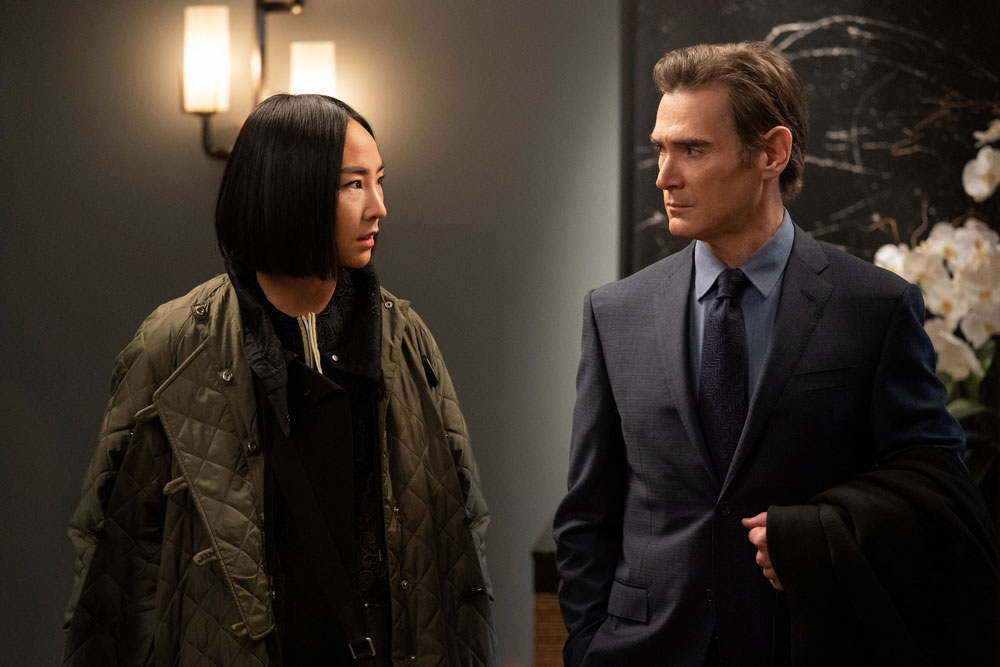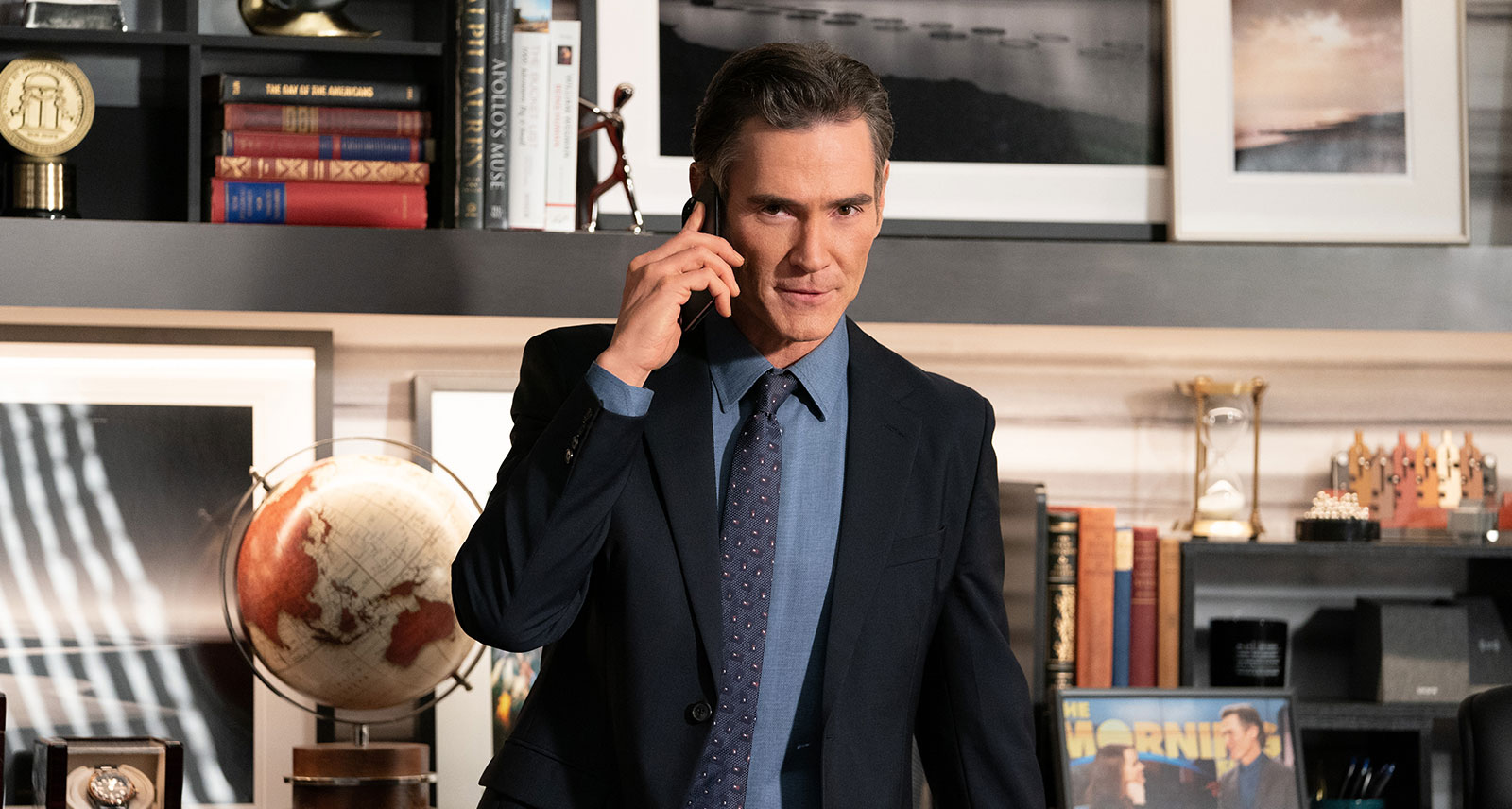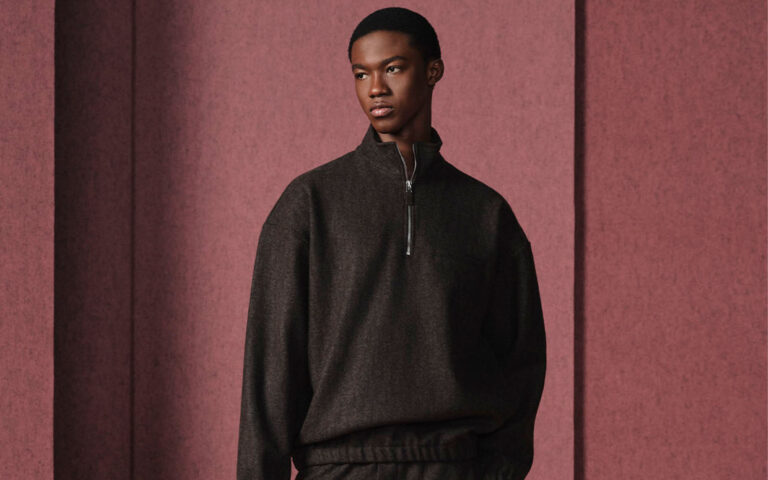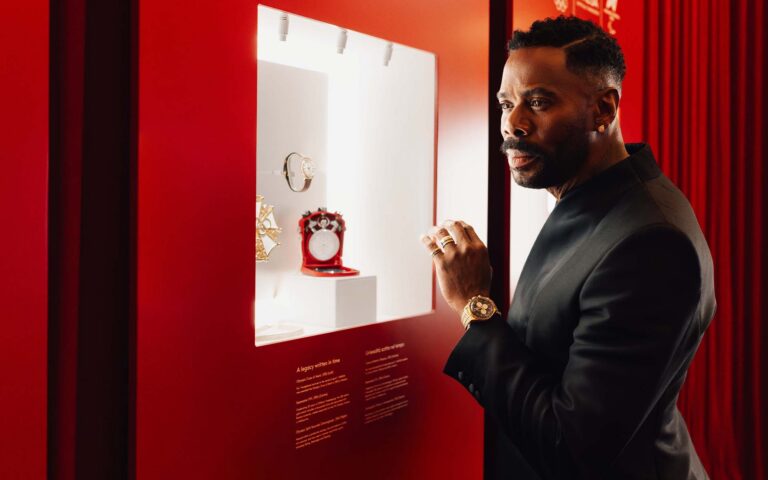The Morning Show’s first season, which premiered on two years ago, tackled head on our cultural reckoning with seemingly good people who do objectively bad things. The second season, out today on AppleTV+, digs deeper into the unanswerable question of how to properly hold those people — usually white men, but not always — accountable for their life-ruining actions, while exposing the perils or limitations of cancel culture. Amid star turns for Jennifer Aniston, Reese Witherspoon, and Steve Carell, one performance shines especially bright: Billy Crudup as Cory Ellison, the newly-appointed network CEO tasked with revamping UBA’s image after an explosive sexual misconduct scandal — a job akin to steering the Titanic away from the iceberg.
The key to Crudup’s magnetic performance is his ability to be as charismatic as he is elusive. With a face as youthful and versatile as his, the smallest expressions are loaded with meaning. Whether he’s breaking into manic laughter, confessing his innermost feelings to a coworker, or flinging himself into crisis management mode alongside his new executive (a brilliant Greta Lee), you can’t be sure of intentions or judgement. He’s both good and evil, sincere and manipulative, Batman and the Joker. In other words, his character encapsulates the core conceptual questions the show poses about the moral dilemmas of our time. No wonder he won the Emmy for Best Supporting Actor in 2020.
Here, Crudup shares his thoughts on cancel culture, his expanded role, and where a hypothetical third season might go.
How did shooting this season feel different from the first?
Part of the first season I felt was like excavation. Trying to figure out who Cory was like going to the Raiders of the Lost Ark cave, looking for the center of it and a little idol that will tell us what the whole thing is about. Cory is just so filled with twists and turns and that’s the way he was written. I think the writers were circling around his motivations as well. I really enjoy the process of discovery, script by script, moment by moment, scene by scene and there was a novelty to that experience. It was a total collaboration with everybody involved and it’s just rare when that kind of thing happens. I felt so grateful to be a part of that. To have it received in a way that people enjoyed was otherworldly; that just never happens. So, the process of working on the second season couldn’t have been more dramatically different because we had had that experience. You can’t continue a quest for understanding when you have established who that person is. You can change the environment that they have to navigate which uncovers, perhaps, new characteristics that they have to explore which is precisely what the writers and creators decided to do – change the landscape and change the stakes. All of the things that I think were truly enjoyable about it before like not knowing his motivations or his kind of gleeful antagonism, they are kind of stripped from him in a way. I guess we’ll get to see what kind of leader he is and whether or not that is as infectious for people as what kind of disrupter he was.
What do you want people to know about Cory? Like, which “side” do you think he’s on?
Well, that’s great question. I suppose in general, particularly, when I look back at the kind of roles that have spoken to me throughout my career, I have appreciated characters that seemingly occupy one part of the iconography of storytelling – a protagonist, antagonist or whatever. The writer has chosen to undermine that in some way with characteristics that are in opposition so that’s continued with Cory. The notion that he would know whether he was going to be archetypically portrayed as good or bad will be completely lost on him because he’s so busy trying to manage the moment. The moment is filled with gray area decisions, with having to capitulate on things that you don’t want to, with having to think shrewdly about manipulating a particular situation, with imagining that you’re making a decision that’s positive for everybody in the long run, knowing full well, it is going to be devastating in the short run. Does that make a person good or bad? That’s the question. I think, for Cory, he is hanging his hat on an internal moral compass that speaks to the general notion that the more people we include in our community, in all of the various power dynamics, the better off we will be. If pluralism is interesting to you, if democratic capitalism is interesting to you, it might be because we should be celebrating all of our individual assets, which may not always be complimentary but taken in their sum total we’ll have a better iteration of a community and a society. I think that’s at the heart of Cory’s point of view. Whether or not the audience ever gets to that or whether or not the show ever gets to that who can say. I always play the characters from a point of view which most of us have to adopt every day which is I’m doing the best that I can.
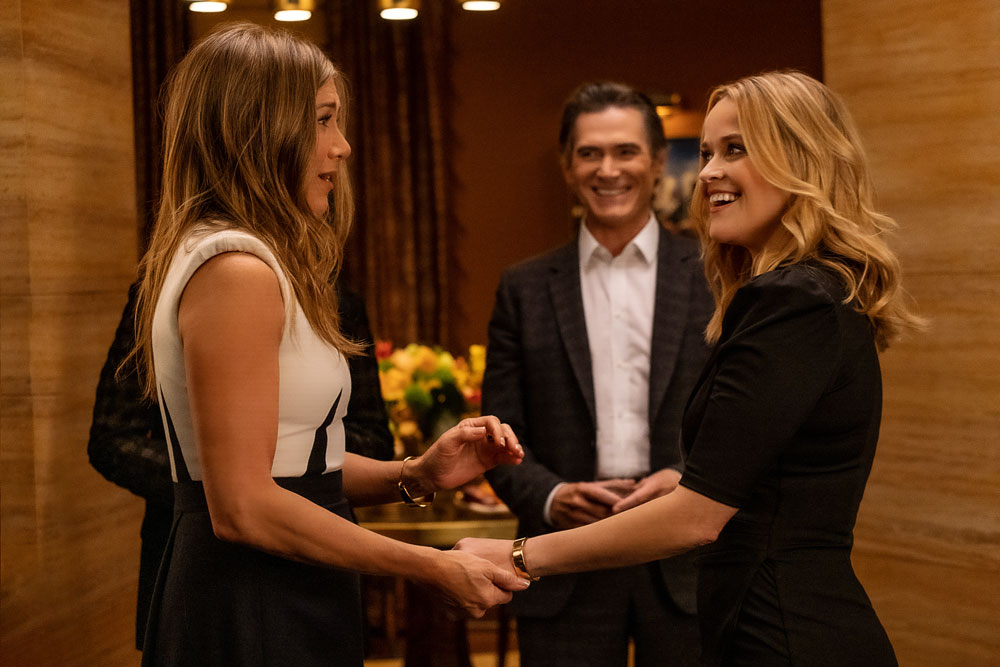
What do you want audiences to take away from this season?
I’m suspecting the people that were interested in the show in the first season were interested or, at the very least, accepting of the idea that this show was going to pass judgment on many people. There might be a few people that draw our ire, but the majority of those people are then given a little closer examination so that our proximity to them challenges our desire to cancel them. I think that’s the really interesting thing to do with this period of time from a narrative point of view. In reading the scripts, it seemed as though Carrie and her writers and Mimi in her direction were attempting to elongate that process of examination and continue what, I think, is a very exciting journey of playing with an audience’s expectations. What’s right or wrong, what’s good and bad, how people arrive at moral-ethical decisions, how they put them into the real world and whether or not the real world can accommodate them. What do they do if the real world doesn’t accommodate them and they have to keep on moving because all of us have to get through the fucking day. It doesn’t leave you feeling like yay, you know? At the end of it, it leaves you feeling like uhh life. To me, that’s exhilarating and should be a healthy dose of our entertainment meal, we should get a good helping of that every time.
What was the biggest challenge on set this season?
You know, so many people have been thrust into unemployment and what that does on your psyche is heavy. So, when we got up and started running again, I just felt that enormous relief at taking on a task that was familiar to me – the storytelling and acting – and not trying to understand infectious disease, socio-political attitudes, how the government has run, statistics, what immune responses are like, all these things that I did not anticipate I would be spending all of my rays examining. To get back to the thing that I know how to do which is something, you know, as silly and superficial as playing a character on a TV show, was an enormous relief.
That being said, it wasn’t without challenges. The production company and Apple wanted to do everything in their power to keep everybody as healthy as possible and work. That took rigor, thought, comprehension [and] like a level of self-consciousness about how we’re treating ourselves in our workplace. In order to keep everybody working and healthy is totally anathema when it comes to acting. In acting you’re trying to be not self-conscious so you can appear as though something is happening fluidly for the first time. Self-consciousness is a huge impediment to being good at acting. We had these two competing things going on and those are just on the practical level. On a thematic and narrative level, the first season I felt like I spent a lot of time with Mimi, Carrie, Kristin, Michael, all of our producing partners and Jen, Reese, trying to understand who Cory was, so that I can help facilitate how he’s gonna help the show. I felt like we closed in on somebody by the end of the season, which was very useful. That being said, they then completely changed the landscape around him so trying to figure out a way in which all of the attributes that we had built and sort of put in our arsenal in the first season could be employed in this new situation was a little bit of a mind meld. But as I said, I couldn’t be more grateful and thankful that I had the opportunity [to be able to do] that problem solving.
If there’s a third season, where do you think the show would go? Where would you like to see it go?
Well, I hadn’t even thought about that. I think so far, it appears as though this theme of disruption is central to the show and the writers. The disruption of social hierarchies, the disruption of power dynamics, the disruption of journalism and news as a conduit for community understanding all of those things have been thrust into the air. I would imagine [in] a third season people have to deal with the aftermath of that. What it means to come in to work with somebody who has been canceled in a way where they’re just partially cancelled. They’re canceled by proxy, but they’re not fired and they’re not incarcerated, so how do we work with them? How do we begin to build the trust again? How do we share in a language that describes our personal investment in our own lives? And that’s what we’re doing all the time. Every time I walk down the street in New York it’s a constant stream of compartmentalization about how I manage my own reaction to how we’re all trying to navigate this time. Are people flying flags? Are they wearing masks? Are they vaccinated? Are they not vaccinated? Do we have adequate housing for the poor? You cannot walk through New York or drive through Los Angeles without confronting these kinds of things. At a certain point that has to die down because we can only all fight for so long. What happens when the fighting is over and there’s no winners or losers? There’s just like a little bit of progress. How do we go back to all communing? Maybe that’ll be the source for the third [season].
